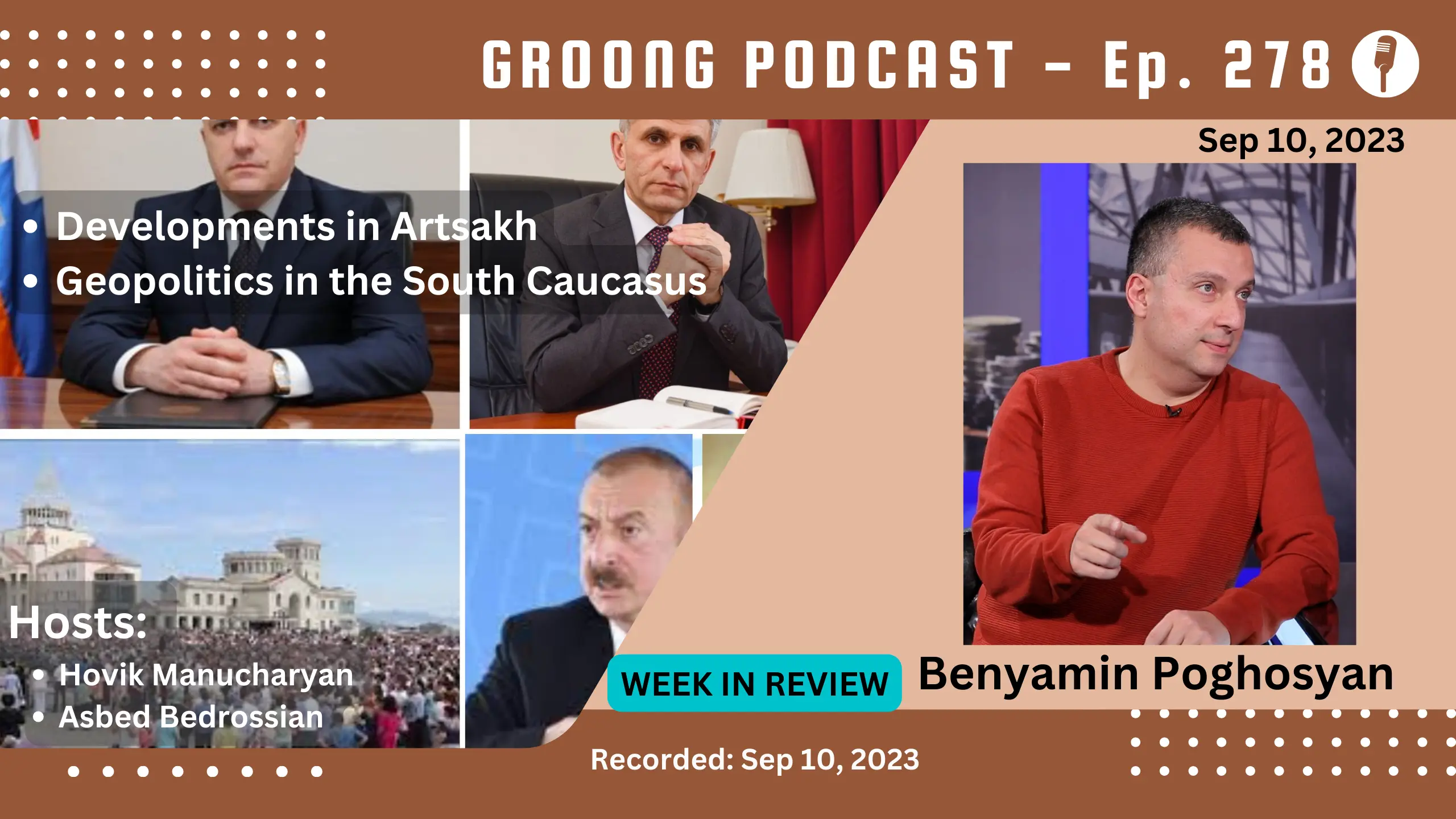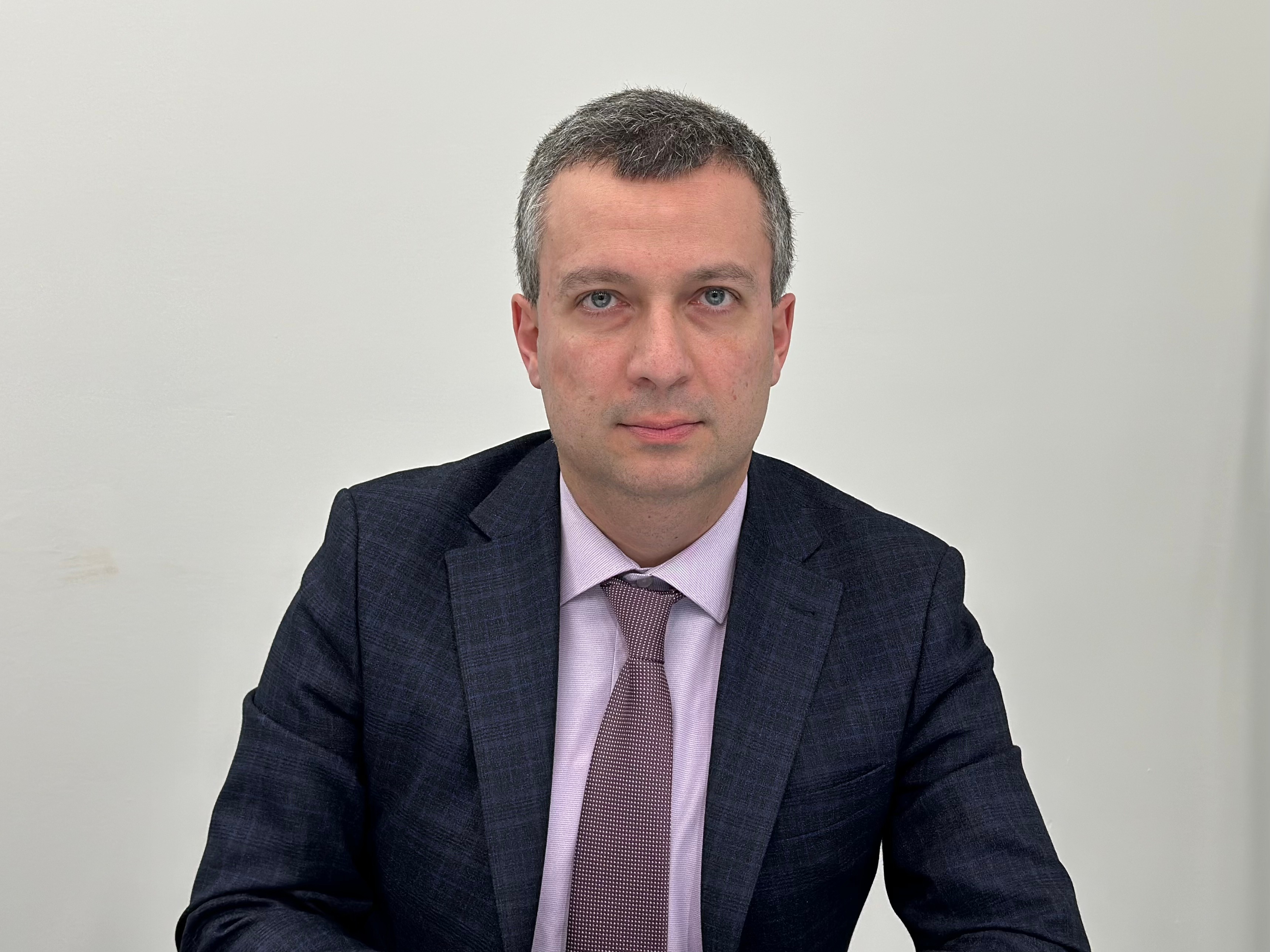
Guest:
Topics:
- Developments in Artsakh
- Geopolitics in the South Caucasus
Episode 278 | Recorded: September 10, 2023
Show Notes
Developments in Artsakh
Election of New President
Over the weekend the parliament in Artsakh elected a new president to replace Arayik Harutyunyan, who resigned a week earlier. Samvel Shahramanyan is an ally of former president Bako Sahakyan and has led the Artsakh Security Council during Harutyunyan’s presidency.
Shahramanyan stated that Artsakh must get status, and be connected via the Berdzor/Lachin corridor to Armenia.
Question:
- What is to be expected from Shahramanyan’s presidency?
Shahramanyan’s Potential
Overall, the EU, the US, and the Russians, have essentially endorsed Azerbaijan’s proposal, that aid begin to flow through the Aghdam/Akna road, and then a day later the Lachin Corridor be opened.
More importantly, concerning the elections, the EU found itself in “interesting company” like Azerbaijan, Turkey, the organization of Turkic States, the UK, Ukraine, and others who explicitly condemned the elections or at a minimum stated that they don’t recognize the results.
Also important to note is that what Azerbaijan perceives as “opening” of the Berdzor/Lachin corridor is a return to the state previous to June 15, when Azerbaijani border guards were manning a checkpoint on the Hakari bridge. Meanwhile, the checkpoint itself is effectively a blockade. It is being used to kidnap Armenians and present challenges to delivery of aid and movement of people, with the aim of making life untenable, and force Armenians to flee Artsakh.
On Sunday, there was news that the Armenian side had accepted a plan to allow a single Russian truck via Aghdam/Akna, but that apparently fell through in the end because the Azerbaijani side didn’t honor its part of the deal.
Questions:
- What caused Azerbaijan to back out of an apparent previous agreement to send a Russian aid truck through Akna? Are you aware of Azerbaijan’s explicit goals and conditions?
- What cards do Shahramanyan and Ishkhanyan hold with regard to the potential talks with Baku and the rest of the world?
- Can you provide some more details?
As an aside to the Artsakh new presidential election process, we should note that all forces except Samvel Babayan’s “United Fatherland” party supported Sahramanyan’s election, although Babayan congratulated Shahramanyan the following day. Babayan supports opening Aghdam for aid to Artsakh, and has led his own negotiations with the Azerbaijani side and has argued in the past that Artsakh should offer cooperation with Aliyev to remove Russian peacekeepers, as a negotiation card.
Question:
- Can you explain the Babayan factor in Artsakh politics and geopolitics?
Geopolitics in the South Caucasus
Shifting EU Policy on Artsakh?
Let’s drill down a bit on the EU policy towards Artsakh and Armenia over the past few years.
With the exception of France, the EU seems to have a very specific goal on Artsakh, which was expressed by Pashinyan in his April 2022 speech, where he said that the international community is asking Armenia to lower the bar just a little bit. The impression set at the time (at least for some) was that for this minor compromise, the international community would then strongly back Armenia and enact guarantees for the security of Artsakh.
Around those times, the principle of “self determination”, a widely recognized international principle, fell out of use from the announcements and speeches of EU policymakers. One time, Olaf Sholz mistakenly used it during a conference with Pashinyan, but the official record was quickly corrected, further indicating the systematic nature of the erasure of self-determination from the political agenda.
Pashinyan went to Brussels to explicitly verbally recognize Artsakh as part of Azerbaijan an act that many say contravenes the Armenian constitution and legislation. Yet, on the issue of rights and security, we’re seeing a further deterioration.
Even the EU Monitoring Mission, that is deployed solely in Armenia, doesn’t seem to have done much. First, Pashinyan announced that the EU is there to keep tabs on Russia and Armenians to assure them that we’re not the aggressors in border incidents. We then witnessed the EU monitoring mission being absent and not able to record incidents such as the one in Sotq earlier this year. Even during those incidents where the EU mission was clearly present, it doesn’t make any public statements about them, only saying that it’s only responsibility is to inform EU policy makers. When the EU monitors themselves were targeted by Azerbaijan, the EU mission went so far as to publicly deny that fact and only admit it when video of the incident leaked.
Question:
- Can you explain the current position of the EU on Artsakh?
- When the discussions about “lowering the bar” surfaced, in April 2022, you said that the EU supports Artsakh as part of Azerbaijan with Armenians having “some autonomy” (either out of stupidity or feigning naivete and believing this is really possible). Do you believe that even this position, namely granting “some autonomy”, has changed over time to be even more pro-Azeri?
Armenia - Russia Relations
Last week, we covered the continuing deterioration of the Armenian-Russian relationship. And this week, things continued to head downhill.
Pashinyan held a lengthy interview with the Italian La Republicca, where among many other eye-opening statements he relayed that Armenia’s reliance on Russia as a security guarantor was a strategic mistake.
The next day Armenia announced that it would be participating in military exercises with the US called Eagle Partner 2023. Now, from a military exercise point of view these don’t seem to be very large, just a few hundred people participating, using only small arms. Russia heavily criticized the holding of these military drills, especially in combination with not participating in CSTO exercises.
Then, later in the week, Armenia announced that it would be sending aid to Ukraine. But more than that, Pashinyan’s wife Anna Hakobyan was selected to deliver the aid and participate in a conference. The visit included photo ops with Hakobyan shaking Zelensky’s hand.
Then, things got even worse when there was a verbal remote spat between speaker of Armenian parliament Alen Simonyan and press secretary of the Russian MFA Maria Zakharova. Zakharova used a pretty insulting joke to describe Armenian leadership’s blaming of security problems on Russia. Simonyan in turn said he doesn’t respond to mere “secretaries”, or something to that effect.
Questions:
- How do these small, perhaps seemingly unrelated steps, portend the shifting direction of Armenian geopolitical orientation?
- Why would secretary Blinken issue a warning to not use force to resolve issues around Artsakh?
- Who would be the winners/losers in a scenario where Azerbaijan attacks and takes over Artsakh by force - not necessarily by killing 120,000 people, but certainly by war and death on both sides?
- Could Aliyev and Pashinyan be colluding to remove Russia from the South Caucasus?
Is Another War Brewing?
Over the past 3-4 days, there has been an enormous amount of images and video published by Azerbaijani social media users. Various analysts, including the one we trust, NK Observer on twitter, are predicting a high level of likelihood for a renewed war, potentially much larger than the 44 day war and this time the war will be in Armenia.
The Pashinyan regime warned that Azerbaijan is accumulating forces around Artsakh. Artsakh officials are also confirming that Azerbaijan intends to attack.
And over the weekend US Secretary of State Blinken warned against the use of force around Artsakh.
Question:
- How likely do you see a new major war, with Russian peacekeepers in Artsakh and EU Monitors on the border of Armenia?
Alright, let’s wrap up our topics here. I’d like to ask each of you if there’s been something on your mind this past week that you want to talk about.
Topics from the Panelists
- Benyamin: New Artsakh leadership a ray of hope to avert catastrophe
- Hovik: On the precipice of a new war
Wrap-up
We hope you found our Week in Review helpful. We invite your feedback and your suggestions, you can find us on most social media and podcast platforms. Thanks to Laura Osborn for the music on our podcasts.
Guests

Benyamin Poghosyan
Dr. Benyamin Poghosyan is a Senior Research Fellow at APRI Armenia, a Yerevan based think tank,and the Chairman of the Center for Political and Economic Strategic Studies. He has served as the vice president for research and head of the Institute for National Strategic Studies at the National Defense Research University in Armenia. Dr. Poghosyan was a Distinguished Research Fellow at the US National Defense University College of International Security Affairs. He is a graduate from the US State Department Study of the US Institutes for Scholars 2012 Program on US National Security Policy Making. He holds a PhD in history and is a graduate from the 2006 Tavitian Program on International Relations at Fletcher School of Law and Diplomacy.
Hosts

Hovik Manucharyan
Hovik Manucharyan is an information security engineer who moved from Seattle to Armenia in 2022. He co-founded the ANN/Groong podcast in 2020 and has been a contributor to Groong News since the late 1990s.
Disclaimer: The views expressed by Hovik Manucharyan on the ANN/Groong podcast are his own and do not necessarily reflect the opinions of his employer or any other organization.

Asbed Bedrossian
Asbed is founder of the Armenian News Network Groong and co-founder of the ANN/Groong podcast.